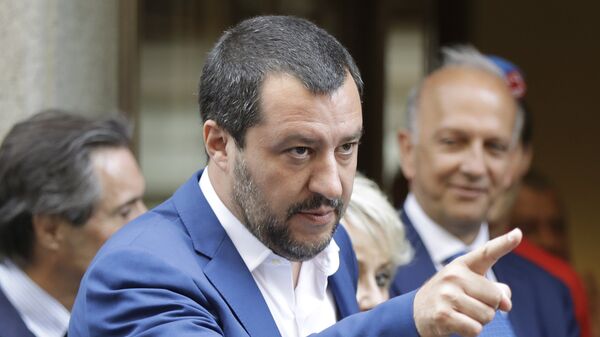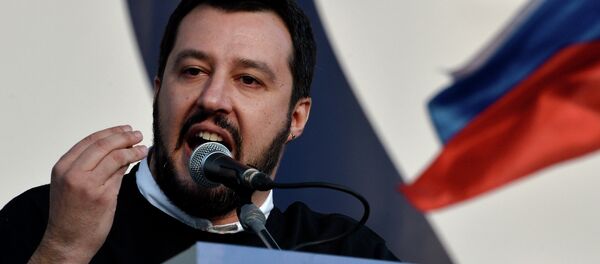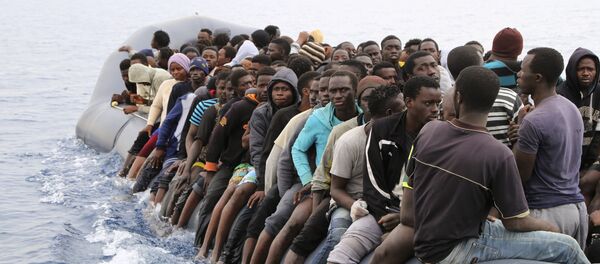On 18 May, Italy's Deputy Prime Minister Matteo Salvini is holding an international rally in Milan, bringing together as many as 11 right-wing European parties ahead of the EU Parliament elections, which are due to take place across Europe between 23 and 26 May.
The question then arises as to how Salvini, the head of Italy's League or Lega party, has seemingly managed to consolidate Eurosceptics, something that the other right-wing European politicians have failed to do so far.
"There are two things that make Salvini stand out: for one, he is in office," says Daniele Pozzati, an Italian journalist and political observer. "He is the only populist party-leader who has made it into the government of a major European country. And a very senior position at that. In his capacity as interior minister, he was able to deliver on his main electoral promise — that of stopping the inflow of illegal migrants from Africa. And this brings us to the second thing that makes Salvini stand out from the right-wing crowd meeting today in Milan: his phenomenal electoral success."
"Compare Salvini's continuing electoral success with Le Pen's dismal performance at the latest, 2017, French presidential elections, in which having passed the first round with 17.9 percent of the vote, she came nowhere near Macron during the second round," Pozzati said.
As for Alternative fur Deutschland (AfD), the Italian journalist envisions that Germany's establishment will do whatever it takes to prevent AfD from obtaining power. Meanwhile, an overwhelming majority of German voters still hesitate to vote for this right-wing political party, he noted.
"Salvini will maintain the leadership among the European Right as long as no populist party obtains bigger numbers than Lega Nord," Pozzati foresees.
READ MORE: While EU Lashing Out at Orban, Hungary Finds Allies in Italy, US
Salvini Pushing Ahead With Pan-European Right Wing Coalition
Matteo Salvini has been pushing ahead with the creation of a pan-European right-wing coalition since he came to power in Italy. Following the formation of Italy's new anti-establishment government on 1 June 2018, the newly appointed deputy prime minister called for the creation of a "League of Leagues" at Lega's fifth party conference in the port city of Pontida in July 2018.
"I think of a league of Leagues in Europe, which unites all the free movements that want to defend their borders and the wellbeing of their children," Salvini stated, addressing the gathering.
The post-election bloc stands to bring together at least 10 parties from 10 nations, drawing its members from Europe of Nations and Freedom (ENF), Europe of Freedom and Direct Democracy (EFDD), and European Conservatives and Reformists (ECR). United by their demand for a tighter immigration approach, the coalition's participants are seeking to challenge the dominant positions of the governing bloc of the European People's Party (EPP), the Progressive Alliance of Socialists and Democrats (S&D), and the Alliance of Liberals and Democrats for Europe (ALDE).
The Salvini Decree and the UN Global Migration Pact
In addition to rallying support from the European Right, the Italian politician double downed on implementing policies targeting uncontrolled migrant flows — the cornerstone of his election platform. The Salvini-sponsored Law No. 132 of 1 December 2018 became the deputy prime minister's first political victory.
On 15 May 2019, the Italian deputy prime minister came up with yet another plan, proposing a bill to fine NGO rescue boats up to €5,500 for each migrant they bring to Italy's shores.
In addition, Salvini strongly opposed the signing of the 2018 UN Global Migration Compact, a non-binding document aimed at legalising and regularising illegal mass migration, insisting that it was up to the Italian parliament to decide whether to adopt the pact.
He was supported by Prime Minister Giuseppe Conte, who stated in November 2018 that "the Global Migration Compact is a document that raises issues and questions that many citizens have strong feelings about."
While a total of 152 countries voted for the compact, five states (the United States, Hungary, the Czech Republic, Poland and Israel) voted against it; 12 countries abstained, including Italy, Austria, and Switzerland.
The views and opinions expressed by the speakers and the contributor do not necessarily reflect those of Sputnik.





